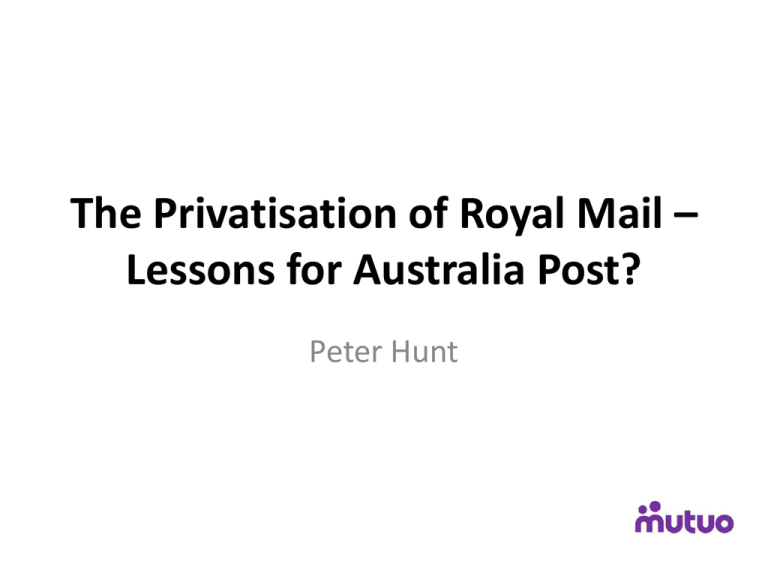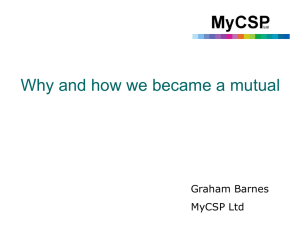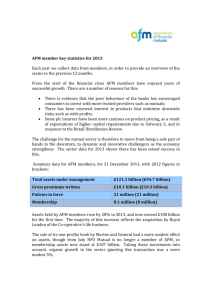the powerpoint presentation.
advertisement

The Privatisation of Royal Mail – Lessons for Australia Post? Peter Hunt Background • Royal Mail seen as a loss making and inefficient business for years • Very poor management/union relationships • Attempts to improve management and separate from the state • Successive Governments wanted to privatise it • The last Labour Government only retreated when faced with union opposition and the spectre of a large pension deficit liability The Coalition Government • After the 2010 Election, the Coalition moved rapidly to sell the business • Introducing the necessary legislation • Accepting the £9bn pension liability on behalf of the taxpayer • Separation of Royal Mail from the loss making Post Office business and allowed for it to be sold as a separate entity, • 90% of its shares to be privatised and 10% to be held by employees • The largest ever employee share issue in the UK, and separately Post Office Ltd would be transformed into a mutual But why privatise Royal Mail at all? • The argument that Government was no good as a business owner • The suggestion that it could not manage business as well as the private sector • The changing competition landscape in Europe • Parcel trade eclipsing letters • But the business had for some time been run at arms length from Government • Professional and well-regarded management in place by May 2010 • Pension liability had to be dealt with by HM Treasury To help make the case for change • The need for capital investment in the changing business • The amount of new capital needed never publicly quantified • Plausible argument for external investment at a time of restricted government spending • Benefits of employee ownership • Much of the argument was conducted from polar ideological opposites Government help for improving Royal Mail’s business • Split from Post Office in a move that instantly lifted a loss-making burden from the firm • Postage stamp prices were increased by more than 30% in a single move • This significantly improved Royal Mail revenues ahead of the planned sale • By 2012, Royal Mail was a successful and well-run business, posting year-end profits of £211 million • Government moved swiftly to complete the privatisation in 2013 Trade unions • Trade unions were opposed to the sale • They promised national industrial action to derail the Government’s plans • However the sale occurred before any action could legally begin • 90% of its shares were privatised and 10% held by employees • The is, the largest ever employee share issue in the UK (separately Post Office Ltd would be transformed into a mutual) Public Share Offer • Share offer successfully launched, with 600 million shares sold @ 330p Valuing the business at £3.3billion • Demand pushed price up to 550p within a week • Firm worth £5.5billion and major political row with opposition parties • Suggested an undervaluation of around 30% • Of 21 City investment banks that supplied early valuations in May 2013, the average ranged from £4bn to £4.8bn • Shares rose further since, to 588p each in February • Now 78% higher than the flotation price The Post Office • • • • Not to be confused with Royal Mail A £1bn turnover business 9,000 independent outlets Many large urban areas have ‘Crown Offices’ with approximately 4,000 directly employed post office staff • The services offered are similar to those in Australian post offices • Similarly under stress from competition from the internet and online banking The Post Office • Post Office Ltd is subsidised by the UK government to provide services on a universal basis • £640 million for 2015-2018 • On top of £1.7 billion since 2007 • Funding to modernise the business and invest in order to lower the cost base and improve efficiency • On track to meet break even and produce profits within the next two years Post Office Mutual • In process of converting into a mutual • Held by its stakeholders in the public interest • A combination of customers, communities, postmasters and staff • Largest single mutualisation of a public sector operation • Excellent example of how to create and retain trust in a large business What has been done? • Inclusive process with all stakeholders represented and consulted • Trade unions have played an important role • Stakeholders helping to craft the new mutual's statement of purpose • Mutuo provided expertise early on to Government • Outlining possible structural mutual options • Process critical in the way it has maintained confidence • Public service ethos Are there lessons for those debating the future of Australia Post? • Commonwealth Government • Trade unions • The public For the Commonwealth Government • A business does not have to be a PLC to succeed • Good management, free from government interference, can successfully run public services in the public interest • Post Office example demonstrates that you can have a commercial edge whilst achieving public accountability • It is an approach that could have been tried for Royal Mail For the Commonwealth Government • Question is how to focus on strong commercial skills whilst maintaining a service ethos • As opposed to profit maximisation for shareholders • Mutuals across the world show time and again how this can be achieved Australia has a wealth of mutual business experience to offer • It should not be ignored in pursuit of an ideological dogma For the Commonwealth Government • In the British example - good management freed from direct control can succeed • It does not require the business to be floated to do this • Australia Post could be a successful commercial mutual • Public service ethos hard wired into its management and governance • If it is sold, make sure that the Australian taxpayer is not short changed • Engage with Australian mutuals to help shape the future For Trade Unions • Lessons are both strategic and tactical • Strategy: – Have the vision to argue for a new type of public service business – That cannot be asset stripped and will be maintained for the public good – Such as a public service mutual, forever protected for the customers of Australia Post – No need to cling to an ideology of nationalized business that will fail both as an argument and vision for the future For Trade Unions • Lessons are both strategic and tactical • Tactically: – Whatever course is chosen, the union needs to be smart and ahead of the game – Anticipate the steps to be taken by Government – Do not get caught reacting too slowly as in the UK – Get inside the tent and shape the future – Work with Australian mutuals to help shape the future For the Public • Who are the owners of Australia Post...? • A long hard look at any proposals before they are allowed to pass • Are the politicians and unions are really working in the interests of Australian taxpayers and consumers? • Without direct engagement from the public in this debate, the outcome is unlikely to serve them well • You have friends in the Australian mutual sector – work with them The Mutual Advantage • A Mutual is more transparent and accountable to the customer base • With a Mutual the customer can influence management decisions and remove the need for government regulation which may occur when a monopoly is privatised • Mutualisation is an alternative ownership of Australian utilities and public assets as mutuals are owed and run by the local stakeholders








